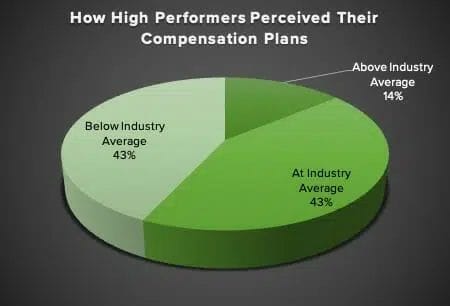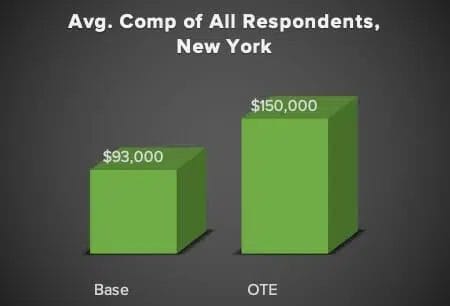
To attract—and retain—top sales talent, sales leaders must develop a competitive compensation strategy. We surveyed sales reps, managers, and VPs across industries to understand the sales landscape in the New York area and to provide benchmarks for salary and OTE, as well as insights about compensation plan structure and incentives.
For a deeper look at sales compensation insights across the United States and Canada, visit our 2019 Sales Compensation Study.
Why sales compensation matters
Compensation is the top driver in attracting sales employees (Gartner 2019), and high performing salespeople are paid above the market average.
Companies can easily disqualify themselves as desirable employers of high-performing salespeople if they don’t provide a competitive compensation package, and such a lack can also negatively impact retention. In a survey of top performers, 79% said that compensation was very or extremely important in their decision to stay with an employer, yet 43% of them also believed their current salary to be below market average.

43% of top performing respondents believe their compensation plan is below the industry average.
Employee perception of compensation plans is a key lever of employee satisfaction and employers should investigate the issue thoroughly—the average cost of turnover per sales rep is $97,690 (DePaul University), and it can be higher for managers and sales executives. Benchmarks can be used to understand what a competitive salary looks like, but it is also important to discuss other factors that sales professionals care about, such as quota structure and incentives.
New York Sales Salaries
About the survey participantsSales professionals in the New York area Roles
Gender
Industries
 |
Base Salary and OTE
When compared with other states in the US, New York’s sales professionals reported the fourth-highest average base salary and third-highest OTE. These are the high-level compensation numbers across all roles—reps, managers, and executives. Role-specific figures are discussed separately.
For all respondents across sales roles (reps, managers, VPs), New York:
Average Base Salary: $93,000
Average OTE: $150,000
When the responses for only the highest performers—defined as salespeople who have exceeded their quotas—were examined, a modest lift in base salary and OTE was observed.
For high performers across sales roles (reps, managers, VPs), New York:
Average Base Salary: $97,000
Average OTE: $155,600

Base salary and OTE of all respondents

Base salary and OTE of top performers
Separated by role, the average base salary and OTE are as follows.
Quota-carrying sales reps:
Average Base Salary: $84,000
Average OTE: $133,000
Front line manager:
Average Base Salary: $110,000
Average OTE: $171,000
Vice President of Sales:
Average Base Salary: $130,000
Average OTE: $216,000

Average OTE by role

Average base salary by role
The highest-paying industry is Professional Services, with the others ranked as follows:
- Professional Services
- Software
- “Other” industries
- Industrial or Manufacturing
- Information Technology & Services
- Healthcare
Compensation split
The split between base salary and quota is another important factor in attracting and retaining the right talent, yet over half (53%) of respondents said they didn’t have their ideal compensation split.
The ideal balance depends on the company’s strategy and individual responsibilities. The respondents surveyed showed a wide range of splits, but base salary typically formed the larger portion of their total compensation package.
50% base / 50% commission:
25% of respondents
80% base / 20% commission:
25% of respondents
60% base / 40% commission:
24% of respondents
100% base salary:
18% of respondents
0-40% base salary (commission-heavy):
8% of respondents

Respondents’ compensation split between base salary and commission
Incentives
In examining the incentives included in respondents’ compensation packages, it was found that 82% had uncapped commission, letting them earn in a way that reflected the value they brought to a company. In addition, 53% had accelerators, and some respondents enjoyed team bonuses and recognition programs. Only 16% of respondents were compensated with equity.

Incentives in respondents’ compensation packages
Compensation’s role in retention
Competitive compensation is a major factor in retention, and 79% of respondents said it was very or extremely important when deciding whether or not to stay with their current employer.
43% of high performers believed their compensation plan was below industry average, while another 43% believed it was at industry average; only 14% believed it to be above average.
In order to lower turnover rates, employers should have annual compensation plan reviews to bring more of their top performers into the group who believe they are being paid competitively—and above the average.
Top areas for improvement
Survey respondents reported their top concerns about their total compensation package and sales support structures.
The main concerns reported were:
-
-
- Having a fair and achievable quota
- Improving incentives
- Having an easy-to-understand compensation plan
-
Not only do employers need to pay a competitive base salary, they also need to consider the design of their plans, to make them easily understandable and clear on how success and increased earnings can be achieved.
Other factors that can be examined and improved upon include:
- providing better sales support
- designing territories effectively
- paying in a timely matter
- improving the companywide sales strategy, to instill confidence in the sales force
- providing non-monetary benefits (typically vacation, healthcare, work-from-home time, mentorship, and perks)

Respondents cited a number of concerns about their current compensation packages and the support provided for their sales role
Developing a competitive sales compensation plan
Compensation is a key driver of quality hiring and retention, yet top performers may not perceive their packages as properly reflecting the value they bring to their teams. This jeopardizes their relationship with their employer, and turnover is costly to a company’s revenue, brand, and morale.
Leaders should use industry benchmarks to ensure above-average compensation for sales professionals and to develop a well-rounded package that not only reflects the right numbers, but is also structured in a clear way with advantageous quota splits and incentives.
For more information about sales compensation, including additional data from sales professionals across the US and Canada, download the Peak Sales 2019 Sales Compensation Study.
relpost-thumb-wrapper
Related posts
close relpost-thumb-wrapper
Eliot Burdett
Eliot received his B. Comm. from Carleton University and has been honored as a Top 40 Under 40 Award winner.
He co-authored Sales Recruiting 2.0, How to Find Top Performing Sales People, Fast and provides regular insights on sales team management and hiring on the Peak Sales Recruiting Blog.
Latest posts by Eliot Burdett (see all)
- 20 Of Our Favorite Books About Sales Management and Sales Leadership – October 20, 2023
- How To Make Progress On Your Sales Goal Without A Sales Leader – September 15, 2021
- Augment Your Recruiting Strategy During “The Great Resignation” – July 26, 2021




